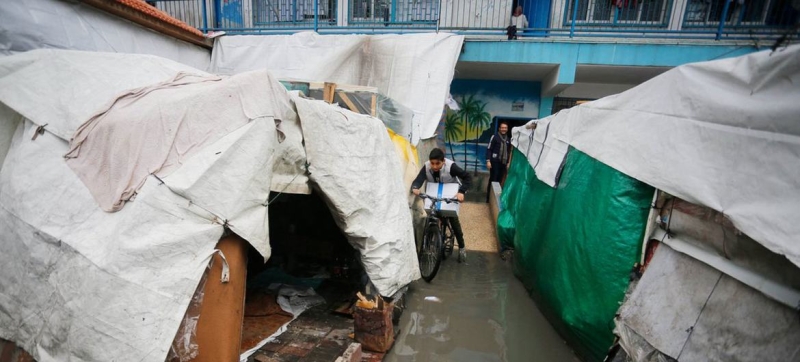
More than 37,000 buildings were damaged or destroyed in Gaza. UN: Gaza’s economic recovery could take decades Economic Development
Israel’s military operation in Gaza has significantly accelerated the economic decline in the sector and led to a 24 percent decline in GDP in 2023. GDP per capita decreased by 26.1 percent. This is stated in the report of experts of the United Nations Conference on Trade and Development (UNCTAD), published on Wednesday. To analyze the situation in the enclave, experts used satellite images and official data.
Economy in ruins
Gaza’s economy was already in decline. As UNCTAD notes, in the first three quarters of 2023 it decreased by 4.5 percent. Residents of the sector faced problems such as limited access to clean water, irregular electricity supply and lack of an adequate sewerage system. The unemployment rate was 45 percent.
Israel’s military operation, which began in response to the Hamas attack on October 7 last year, led to the displacement of 85 percent of Gaza’s population and a halt in economic activity. As of December 2023, unemployment in the sector rose to 79.3 percent.
The bombing damaged or destroyed 37,379 buildings, representing 18 percent of the total built area in Gaza. The sector, half of whose population is children, has now become virtually uninhabitable as its residents lack adequate sources of income, access to water, sanitation, health care and education.
Decades and billions of dollars for restoration
At the same time, if a military operation ended right now, and reconstruction would immediately begin in the sector, Gaza’s economy would only recover by 2092. UNCTAD experts clarify that the calculations included a growth rate of 0.4 percent observed in Gaza in 2017-2022.
Even under the most optimistic scenario, in which the economy grows at 10 percent a year, per capita GDP in the sector will not reach pre-blockade 2006 levels until 2035.
As economists note, rebuilding Gaza after the current military operation will require a financial commitment several times greater than the $3.9 billion that was allocated after the military operation in Gaza in 2014. The speed of restoration will depend on the timing of the end of hostilities and the activity of donors. Without proper funding, reconstruction of the sector will take decades, experts emphasize.
At the same time, UNCTAD warns that a return to the status quo that existed before October 2023 will not allow breaking the vicious circle of destruction and subsequent partial restoration. Gaza’s economic difficulties, rooted in a 56-year occupation and 17-year blockade, require realistic strategies to unlock its economic potential through measures including rebuilding an international airport, building a seaport and allowing Palestinians to exploit the natural gas fields discovered in the 1990s in the Mediterranean Sea off the coast of Gaza.
Immediate release of hostages and ceasefire
UN Secretary-General Antonio Guterres recalled the large-scale destruction in Gaza while speaking on Wednesday at a meeting of the UN Committee on the Exercise of the Inalienable Rights of the Palestinian People.
“The ongoing conflict and the relentless bombing of Gaza by Israeli forces have resulted in civilian deaths and destruction at a pace and scale not seen in recent years,” he said Guterres.
More than 26,750 Palestinians were reportedly killed in Gaza, more than two-thirds of them women and children.
“More than 70 percent of civilian infrastructure, including homes, hospitals, schools, water and sanitation facilities in the Gaza Strip, was destroyed or severely damaged. 1.7 million people have been forced to leave their homes and do not know if they will have homes to return to,” he added. The head noted that residents of the sector suffer from food shortages.
Read also:
Gaza Humanitarian Funding Crisis: Desperate Locals Search UN Trucks for Food
Guterres reiterated his call for the immediate release of all Israeli hostages, a humanitarian ceasefire, and expanded and unhindered humanitarian access to the Gaza Strip. The Secretary General also recalled the deteriorating situation in the West Bank and events in the region that could provoke a wider escalation. He called for urgent steps to de-escalate.
Griffiths at Security Council: suffering in Gaza worsens every day
Speaking At the UN Security Council on Wednesday, UN Emergency Relief Coordinator and Deputy Secretary-General Martin Griffiths described the disastrous humanitarian situation in Gaza. He said more than 60 percent of the housing stock was destroyed or damaged, and more than 75 percent of local residents were forced to leave their homes. Griffiths noted that all Gazans must be guaranteed the right to voluntary return, as required by international law.
Today’s meeting of the Security Council was convened by Algeria, which became a member of the Security Council in January 2024. The main goal is to discuss the provisional measures announced by the International Court of Justice in South Africa’s claim against Israel. The judges, we recall, ordered the Jewish state to “take all measures in its power” to prevent the crimes of genocide, as well as to allow vital humanitarian aid to flow into the war-torn enclave.
Coordinator UN Emergency Relief Agency told Council members that despite dangerous conditions, aid workers continue to support the people of Gaza. He called for guaranteeing access to all those in need and security for humanitarian personnel, as well as ensuring the supply of necessary supplies to the enclave.
At the center of desperate efforts to help Gazans, Griffiths says, is the UN agency for Palestine refugees, UNRWA. The Deputy Secretary General admitted that the accusations of UNRWA employees of involvement in Hamas attacks on Israel shocked him. He recalled that the investigation is ongoing, but urged not to jeopardize the activities of the entire organization because of a few people.
“Our humanitarian work in the occupied Palestinian territories is entirely dependent on adequate UNRWA funding and responsiveness. Decisions to withhold funding to UNRWA must be reversed,” Griffiths stressed.
